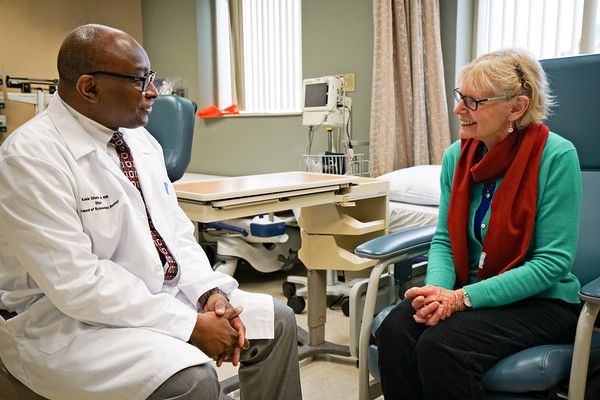First-hand advice from a survivor

“Happy birthday to me.” KayEllen Gebhart says this in a flat voice, recalling her birthday in 2008 — the day she learned she had stage III ovarian cancer. The bad news came after a CT scan to find out what was causing the “tummy issues” her family doctor thought might be caused by her gallbladder.
She has learned a lot of things on the road from diagnosis to survivorship. Here are four:
1. Women with ovarian cancer “need to seek out a gynecologic oncologist,” not a regular gynecologist or general surgeon, she says. “I feel that was lifesaving.” Research supports that choice: gynecologic oncologists have specialized training in treating cancer, and ovarian cancer patients whose surgery is performed by a gynecologic oncologist tend to live longer. KayEllen’s physician, Kunle Odunsi, MD, PhD, formerly the Roswell Park Deputy Director, Chair of Gynecologic Oncology, and Executive Director of the Division of Translational Immuno-Oncology, agrees: “If you have, or suspect that you have a gynecologic cancer, you should be seen and treated by a gynecologic oncologist from the beginning, so you can receive the most optimal treatment for the disease.”
2. "Do lots of research and ask lots of questions.” KayEllen’s daughter, Nicole, became the chief researcher for her mom. She learned that patients shouldn’t sit back after they go into remission, because the disease is likely to recur. When KayEllen’s first treatments were complete, Nicole told her, “Mom, I don’t want to scare you, but we’re going to need to find something else.” Nicole located clinical trials of promising new treatments that might help her mom.
3. “Jump at the chance to take part in a clinical trial,” KayEllen says. “There are a wide range of clinical trials available for patients in remission and for those with recurrent disease.” She has completed four clinical trials — one trial at Duke University and three clinical trials at Roswell Park. At Roswell Park, KayEllen received therapeutic cancer vaccines developed by Dr. Odunsi. The vaccines were designed to help her immune system recognize and fight the cancer.
4. Finally, “You need a doctor who is comfortable with your decision to get a second opinion,” KayEllen advises. Richard Cheney, MD, Roswell Park's Chair of Pathology and Laboratory Medicine, agrees. A second opinion, he says, is ”a cost-effective way to ensure that the diagnosis is accurate and the proposed treatment plan is the best option. If your physician is offended that you want to get a second opinion, find a new doctor.”
Hear KayEllen and Nicole tell their story.
